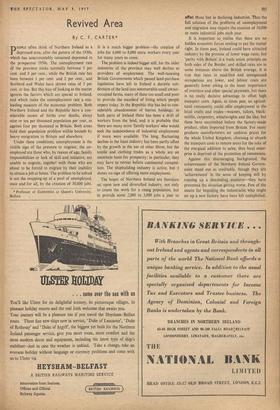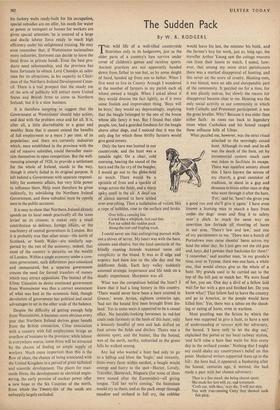Revived Area
By C. F. CARTER* nEOPLE often think of Northern Ireland as a r depressed area, after the pattern of the 1930s, which has unaccountably remained depressed in the prosperous 1950s. The unemployment rate Of the province sticks normally between 5 per cent. and 9 per cent., while the British rate has been between 1 per cent. and 2 per cent., and Scotland and Wales have shown rates of 3 per cent. or less. But this way of looking at the matter ignores the factors which are special to Ireland, and which make the unemployment rate a mis- leading measure of the economic problem. Both Northern Ireland and the Republic have a con- sideiable excess of births over deaths, about nine or ten per thousand population per year, as against four per thousand in Britain. Both areas hold their population problem within bounds by heavy emigration to Britain and elsewhere.
Under these conditions, unemployment is the visible sign of the pressure to migrate; the un- employed are those who, by reason of age, family responsibilities or lack of skill and initiative, are unable to migrate, together with those who are about to be forced to migrate by their inability to obtain a job at home. The problem to be solved is not the mopping-up of a pool of unemployed, once and for all, by the creation of 30,000 jobs.
*Professor of Economics at Queen's University, Belfast. It is a much bigger problem—the creation of jobs for 6,000 to 8,000 extra workers every year for many years to come.
The problem is indeed bigger still, for the older industries of the province may well decline as providers of employment. The well-meaning British Governments which passed land-purchase legislation have left in Ireland a durable sub- division of the land into innumerable small owner- occupied farms, many of them too small and poor to provide the standard of living which people expect today. In the Republic this has led to con- siderable abandonment of barren holdings; in both parts of Ireland there has been a drift of workers from the land, and it is probable that there are many more 'family workers' who would seek the independence of industrial employment if more were available. The long, fluctuating decline in the linen industry has been partly offset by the growth in the use of other fibres, but the textile and clothing trades as a whole are an uncertain basis for prosperity; in particular, they may have to retreat before continental competi- tion. The shipbuilding industry is active, but it shows no sign of offering more employment.
The hopes of Northern Ireland are therefore set upon new and diversified industry, not only to create the work for a rising population, but to provide some 2,000 to 3,000 jobs a year to offset those lost in declining industries. Thus the full solution of the problems of unemployment and migration may require the creation of 10,000 or more industrial jobs each year.
It is important to realise that there are no hidden economic forces tending to put the matter right. In times past, Ireland could have attracted industry by the promise of lower wage rates; but 'parity with Britain' is a trade union principle on both sides of the Border, and skilled rates are in some instances above the British average. It is true that rates in unskilled and unorganised occupations are lower, and labour costs are generally lower owing to the lesser importance of overtime and other special payments, but there is no really decisive advantage to offset high transport costs. Again, in times past, an agricul- tural community could offer employment in the local crafts and trades—weavers, tailors, black- smiths, carpenters, wheelwrights and the like; but these have succumbed before the factory-made product, often imported from Britain. For many products manufacturers set uniform prices for the whole United Kingdom, choosing to absorb the transport costs to remote areas for the sake of the marginal addition to sales; thus local enter- prise is deprived of the protection of remoteness.
Against this discouraging background, the achievements of the Northern Ireland Govern- ment stand out as creditable, though they are 'achievements' in the sense of keeping still by running up a descending escalator—they have prevented the situation getting worse. Few of the means for beguiling the industrialist who might set up a new factory have been left unexploited; his factory waits ready-built for his occupation, special subsidies are on offer, his needs for water or power or transport or houses for workers are given special attention, he is assured of a large and docile labour force ready to reach high efficiency under his enlightened training. He may even remember that, if Westminster nationalises more industries, Stormont can decide to leave the local firms in private hands. Even the best pro- ducts need salesmanship, and the province has been fortunate 'to obtain Lord Chandos as sales- man for its attractions, in his capacity as Chair- man of the Northern Ireland Development Coun- cil. There is a real prospect that the steady use of the, arts of publicity will attract more United States and British firms to come to Northern Ireland; but it is a slow business.
It is therefore tempting to suggest, that the Government at Westminster should take action, and deal with the problem once and for all. It is, after all, a little discreditable to a great and wealthy State that it cannot extend the benefits of full employment to a mere 3 per cent. of its population; and there are /certainly industries which, once established in the province with the aid of massive subsidies, could thereafter main- tain themselves in open competition. But the well- meaning attempt of 1920, to provide a settlement for the whole of Ireland, stands in the way, though it utterly failed in its original purpose. It left behind a Government with separate responsi- bility for economic affairs, but very little power to influence them. Help must therefore be given indirectly, by subsidising the Northern Ireland Government, and these subsidies must be openly seen in the public accounts.
It is easy to show that Northern Ireland already spends on its local needs practically all the taxes levied on its citizens; it makes only a small contribution to defence, foreign affairs, or the machinery of central government in London. But it is probably true that other areas—the north of Scotland, or South Wales—are similarly sup- ported by the rest of the economy; indeed, that most of the country is parasitic on the wealth of London. Within a single economy under a com- mon government, such differences pass unnoticed and unmeasured, but a separate government creates the need for formal transfers of money which may attract opposition. The instinct of the Ulster Unionists to desire continued government from Westminster was thus a correct assessment of what was best in the economic field, though devolution of government has political and social advantages to set in the other scale of the balance. Despite the difficulty of getting enough help from Westminster, it becomes more obvious every year that Northern Ireland derives great benefit from the British connection. Close association with a country with full employment brings an overflow of business to the province; while labour is everywhere scarce,' some firms will be attracted by the chance of finding an ample supply of workers. Much more important than this is the flow of ideas, the chance of being associated with the United Kingdom in a period of great technical and scientific development. The plants for man- made fibres, the developments in electrical engin- eering, the early' promise of nuclear power offer a new hope to the Six Counties of the north, from which the Twenty-Six of the south are unhappily largely excluded.











































 Previous page
Previous page